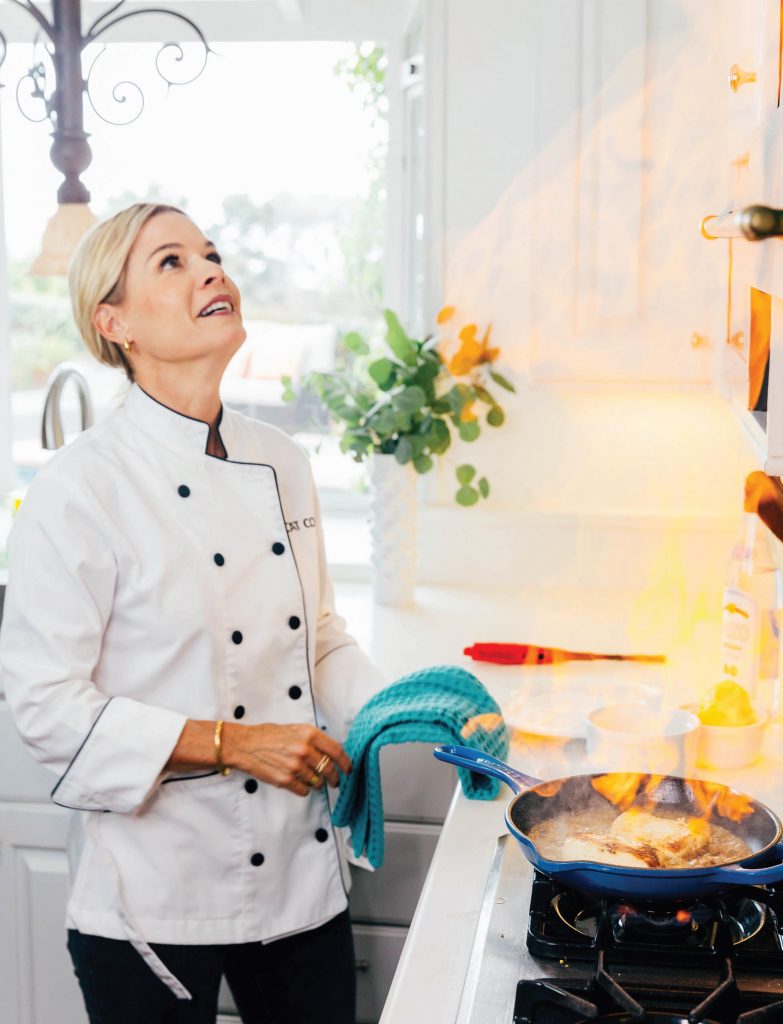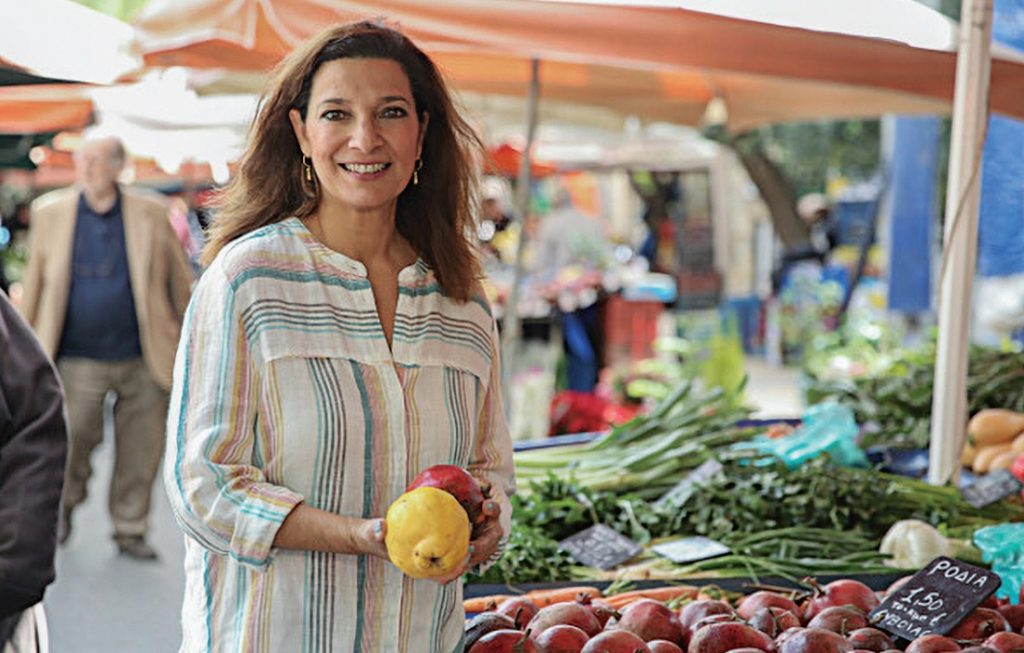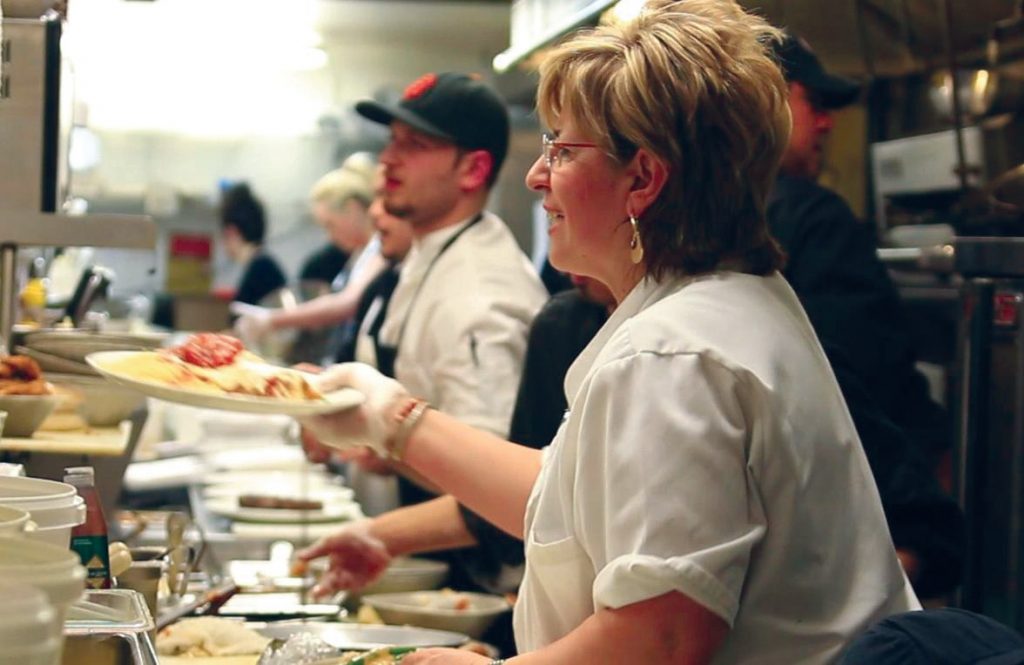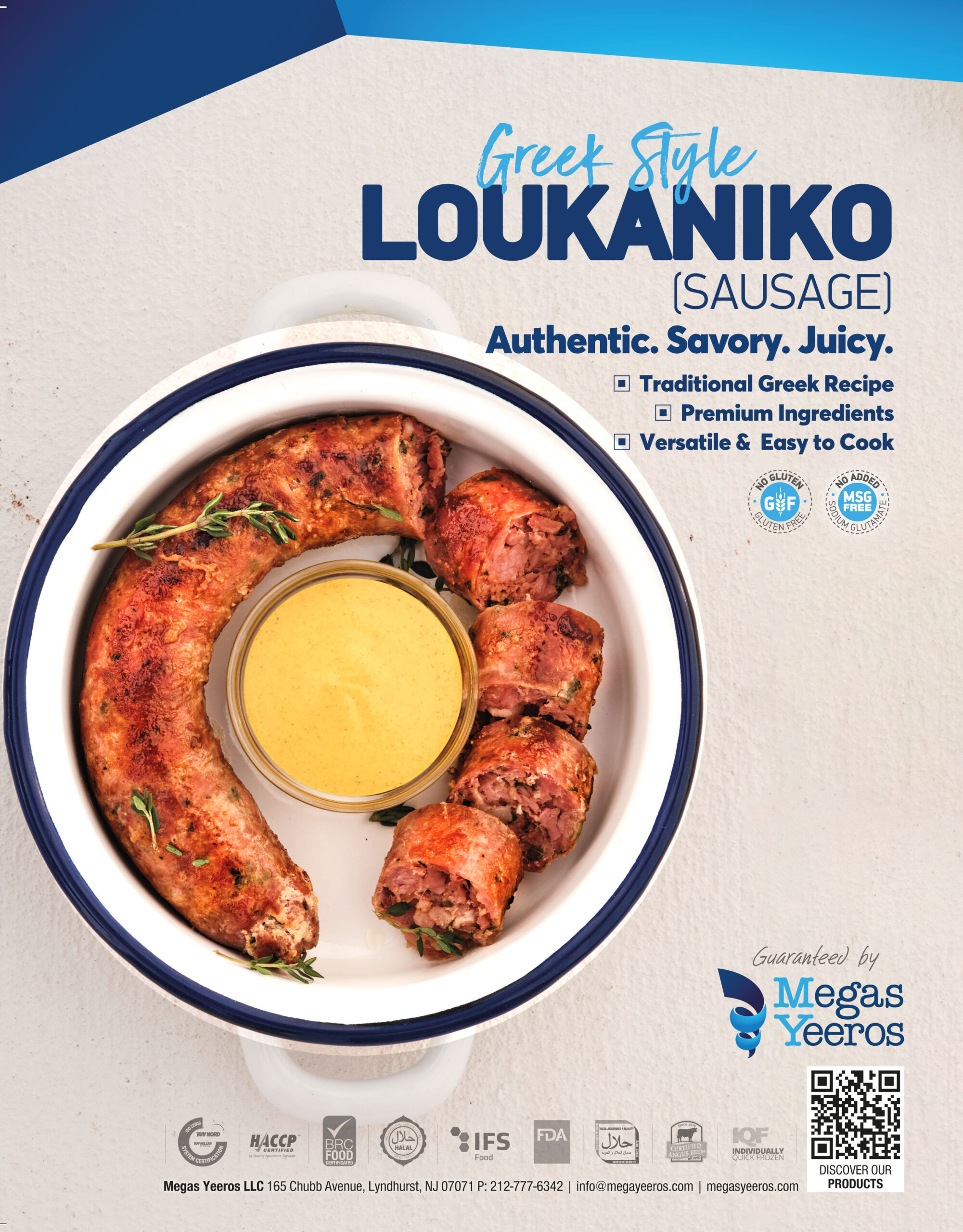A Woman’s Place is in the (Restaurant) Kitchen
Posted by estiator at 14 December, at 15 : 56 PM Print
COVER STORY
How Greek women chefs are changing the culinary landscape.

By Maria Benardis
It’s ironic that, historically, women have been told their place is in the kitchen, yet when you take a look at the restaurant industry, it has been long dominated by male chefs. So much so that Bloomberg News recently observed that it’s “easier for a woman to become a CEO…. than a head chef.”
I recently spoke to Joanna James, who is a director, producer, and writer based in Manhattan. Her documentary A Fine Line explores why less than 7 percent of restaurants in the United States are led by female chefs (according to 2014 Bloomberg study). A Fine Line began as a love letter to her mom, chronicling the difficulties Val James overcame—from finding bank loans to babysitters—as she established her own restaurant in the early 1990s in central Massachusetts. Eventually the documentary grew into a much bigger story filled with dozens of additional voices from across the industry.
“For the longest time,” says James, “women were elbowed out of the professional kitchen with a false narrative, suggesting women wouldn’t want to deal with long hours and physically demanding work, and that the kitchen simply was no place for a woman.”
All of this, she notes, while women have traditionally had the central role in the kitchen and inspired many of the greatest male chefs.
“If you watch A Fine Line or frequent amazing restaurants owned or led by female chefs and restaurateurs, you simply know there are plenty of women in the industry, proving that the false reasoning doesn’t apply,” she says.
“The truth is that for the longest time, the kitchen culture was militaristic, obnoxious, and full of hazing and led to a setting conducive to drinking, drugs, harassment, and poor mental health,” she insists. “Thankfully, this type of disrespectful environment is more and more looked down upon today, mostly because employers have figured out that they cannot hire and retain staff like that. This has made room for not just more women but also men who want to elevate their craft and career, versus move from gig to gig. So better work practices are happening from flexible scheduling, paid family leave, zero tolerance, and fair wage. The culture is transforming, in large part because more women are at the helm enforcing these better business practices,” says James. At the forefront of that transformation have been a number of women chef pioneers who have shattered that glass ceiling, including some Greek American women who have done so on a national and international level.
CAT CORA
Cat Cora is a world-renowned celebrity chef, restaurateur, TV host and personality, actress, avid philanthropist, health and fitness expert, lifestyle entrepreneur, and proud mother of six sons. The Jackson, Mississippi, native made TV history in 2005, when she became the first female Iron Chef on Food Network’s Iron Chef America. Since then, she has broken barriers, becoming one of the first females to dominate the historically male culinary industry. Cora has blazed her own trail through the culinary world, becoming the first female inducted into the Culinary Hall of Fame. She has opened more than 18 restaurants worldwide, built on her foundational philosophy of health, wellness, and sustainability, and has authored three successful cookbooks and a memoir. If that weren’t enough, she started Chefs for Humanity 14 years ago, helping to raise funds and provide resources for important emergency-, education- and hunger-related causes.
Cora just wrapped ABC’s culinary competition series Family Food Fight and opened Little Kitchen Academy, a Montessori-style cooking school for children. She is currently at work on a new cookbook and is opening a third location in Montecito, California, for her heralded Mesa Burger concept. Little Kitchen Academy, which opened in Vancouver, will be soon be joined by three new locations coming soon.
Cora says that her inspiration to enter the food business is rooted in being from a large family in Mississippi. “Cooking and spending time in the kitchen together was a big part of my childhood,” she says. “My mother and father; my grandmother, and my godparents were all great cooks. My father smoked meats and was a drillmaster, while my mother and grandmother taught me eclectic cooking, foods from various regions, and, of course, Greek and Mediterranean cuisine. Julia Child was my mentor while I was in cooking school, and really the one who inspired me to go in the first place,” she says of perhaps the true female pioneer chef. “I met her at a book signing and went to culinary school very soon after.”
But Cora’s road to the top of her profession wasn’t always easy.

“Women face challenges such as media bias, access to capital, sexual harassment, and lack of affordable and accessible childcare, among other things,” she says. “The restaurant business has been a male-dominated industry for so long that the culture surrounding it isn’t welcoming to women.”
Early in her career, in France, she was rejected not once, but ten times. “The letters would say, ‘We don’t allow females in our kitchen,’” she recalls, “and that was only a little over 20 years ago.”
Thankfully, Cora sees the sands slowly beginning to shift. “I think the scene is changing as more and more female chefs are rising to the top and gaining success, but it’s taken a few trailblazers to get us to where we are now,” she says. “I challenge myself to excel in whatever I do, but definitely want to continue to set a good example for young chefs out there, female as well as male.”
Her success, she says, is to a great extent due to the education that she received. “If you want to become a chef, I encourage you to go to culinary school,” she offers to prospective culinarians. “Following the advice of my late mentor, Julia Child, I applied to The Culinary Institute of America and was thrilled when I got accepted. After graduating from the CIA, it was time to put my skills to the test. I went straight to France and apprenticed at two three-star restaurants with Georges Blanc and Roger Verge. After coming back to the States, I was eventually able to partner with Disney and open my very first restaurant, Kouzzina. The truth is that dreams don’t come true glamorously. There’s a lot of hard work that people will never see. My advice to young chefs and anyone with a dream: Stay the course, never give up, always pay it forward, and don’t be afraid to take risks. Nothing great comes easy, so work your ass off.”
DIANE KOCHILAS
Diane Kochilias’s greatest influence is her dad, a cook whose food was “amazing” and left her with many exceptional childhood memories. Her mother, who was widowed at a young age, taught her how to be an upbeat survivor, she says, while others, including Ralph Sergiovanni, John Mariani, and her aunt Mary on Ikaria, inspired her on her path to becoming one of the most recognizable global names in Greek cuisine.
A public figure, Kochilas is the host, creator, and co-producer of My Greek Table, a cooking-travel series on public television broadcast to 95% of the homes in the U.S. and Canada, as well as in Greece and, soon, in Australia. She has authored 18 books in English and Greek on Greek and Mediterranean cooking, among them a few IACP award winners. She also owns and operates The Glorious Greek Kitchen, on Ikaria and throughout Greece, offering cooking and living-well seminars on the “Blue Zone” island, while conducting culinary and rebetiko walking tours of Athens, as well as food and culture weekends in Nemea and Nafplion.

When asked what inspired her to enter the food business, she responds heartily with a Zorba-esque declaration: “I am Greek!” she says, “and that about says it all. My dad was a chef, so food was always part of the fabric of my life. I’ve worked as a restaurant and menu consultant for many of the top Greek restaurants in the U.S., including Molyvos in NYC and Committee in Boston. I ran my own place in Greece for two summers, in my native village on Ikaria. It gave me an appreciation for the heroism it takes to run a good restaurant consistently, day in and day out.”
She acknowledges that it’s a tough world, physically and emotionally. “The hours, the physical exhaustion, the time away from home, the stress … these are all probably among the reasons there are fewer women [chefs in the industry]. That said, the operators I do know who are women are among the best professionals I have ever known.”
She attributes her success to “doggedness, persistence, New York moxie, faith in my vision, love of my work, love of people, love of good food, industriousness, a never-give-up and never-take-no-for-an-answer attitude toward life.”
Additionally, she embraces a problem-solving attitude as opposed to problem-making; “respect for the people who work with and for me, generosity of spirit, love of all things Greek, and drive of someone who started from nowhere to make her way in the world.”
VALERIE JAMES
Valerie James, more fondly known as Val, has been the sole owner and operator of Val’s Restaurant in Holden, Massachusetts, since 1991. The restaurant started as a small storefront pizzeria and is today a full-fledged restaurant with two lounges, function room, and patio. Being raised in the restaurant industry and then being told she couldn’t own her own restaurant, James decided as a single mother she was going to find a way to make her dream come true. That is why mentorship and giving back to the community she has been part of for 30 years matters so much to her. Today, when James isn’t expediting on the line, making her famous soups or, her favorite part, joining guests in the dining room, she enjoys running after her three granddaughters and traveling with family, bringing back inspiration to her restaurant.
“I was in the industry from a young girl, working by my father’s side,” she says. “He emigrated from Greece, and when he came over, he eventually owned a diner, then pizzerias, and finally a restaurant and bar. So, I fell in love with food, but even more so, hospitality, because my father was the master of connecting with people and making each and every customer feel good about coming together over a meal at any of his establishments.” Speaking of the challenges she would face as a woman restaurateur, she pleads ignorance—at least at first.
“I never knew the numbers [of women in the field] were so bad or even thought about it,” says James. “I worked really hard and had tunnel vision on my dream to open my restaurant and then expand it. When I was working my way up, the attitude was that the men could do it better, faster, and with complete machismo… even though I think the women who were cooking were more knowledgable. I think the big problem was there was a lack of encouragement to showcase the women’s work and let them shine to the point where they also didn’t realize their own skills and talent.
“I strongly believe what will make a significant difference for more women to get into ownership and leadership is when the culture shifts so it is a complete team mentality based on respect and no tolerance for bashing or bullying—and that’s not just for women but anyone in the kitchen to feel valued and welcomed,” she says. “I see how my son runs the kitchen now, and I love how he shares his knowledge to lift others up. It all comes down to motivating others to do what they themselves didn’t even know was possible. Everyone needs someone to believe in them.”
Pressed to explain her success, James attributes it to her “love of people” and ability to treat everyone as friends.
“In terms of my business, it comes down to working as a team,” she says. “My entire staff knows they could depend on me in that I would dive in the hole with them, whether it’s in the dish room or on the line—and they really respect that.”
She believes that what is needed today is for “more men to step up and be part of the solution and embrace mentorship.”
The rise of women in dominant positions in the restaurant and food industry is slowly and steadily changing, and the key to success for women is to show by example that they are just as capable as men, James says. “With talent, focus, patience, and respect, we can demonstrate that we can equally match the top chefs of the world that happen to be male.”


About the Author
Maria Benardis is an award-winning cookbook author, chef, health-and-wellness coach, and founder of Greekalicious, Australia’s first exclusively Greek culinary school. After spending many years as a financial specialist, Benardis returned to her first love—cooking. She honed her skills by working in the kitchen at XO, owned by one of Australia’s most influential celebrity chefs, Neil Perry. Benardis has been featured in The New York Times and Vogue and on the Today show. She has offered “Cooking with Agapi” classes at venues that include Sur La Table and Williams Sonoma; is a food and health blogger for The Huffington Post, Thrive Global, and Mind Body Green; and is the author of three books: My Greek Family Table, Cooking & Eating Wisdom for Better Health, and Greekalicious Feast.














